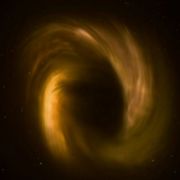Subspace sinkhole: Difference between revisions
m (added image) |
m (added story information) |
||
| Line 5: | Line 5: | ||
A subspace sinkhole is a unidirectional anomaly that produces an extremely strong gravity well, drawing matter into it whenever it opens. Sinkholes are dangerous to starships because the gravimetric shear it emits disrupts the formation of warp fields, preventing escape. When inactive, subspace sinkholes are out of phase with normal space-time, making them difficult to detect. | A subspace sinkhole is a unidirectional anomaly that produces an extremely strong gravity well, drawing matter into it whenever it opens. Sinkholes are dangerous to starships because the gravimetric shear it emits disrupts the formation of warp fields, preventing escape. When inactive, subspace sinkholes are out of phase with normal space-time, making them difficult to detect. | ||
[[Category:Astronomical objects]][[Category:Delta Quadrant]] | The USS Equilism detected a subspace sinkhole in [[Nebula D42]]. | ||
[[Category:Astronomical objects]][[Category:Delta Quadrant]][[Category:Locations]] | |||
Latest revision as of 10:47, 23 September 2008
| This article is considered a canon article for Star Trek: Equilism. |
A subspace sinkhole is a unidirectional anomaly that produces an extremely strong gravity well, drawing matter into it whenever it opens. Sinkholes are dangerous to starships because the gravimetric shear it emits disrupts the formation of warp fields, preventing escape. When inactive, subspace sinkholes are out of phase with normal space-time, making them difficult to detect.
The USS Equilism detected a subspace sinkhole in Nebula D42.
